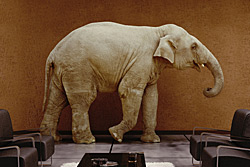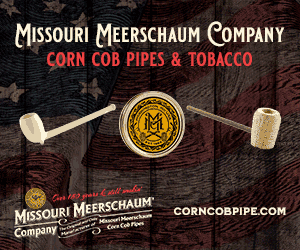Fred Brown
 A Second Front has opened in the Tobacco Wars. And if you are a conspiracy theorist, you might see this latest assault as one that could make pipe tobacco harder to find, harder to sell, and harder to purchase. Why? A major reason is that all of these issues result from the heavy tax burden waiting in the wings to be levied against Lady Nicotine, the beloved brown leaf of pipe smokers.
A Second Front has opened in the Tobacco Wars. And if you are a conspiracy theorist, you might see this latest assault as one that could make pipe tobacco harder to find, harder to sell, and harder to purchase. Why? A major reason is that all of these issues result from the heavy tax burden waiting in the wings to be levied against Lady Nicotine, the beloved brown leaf of pipe smokers.
If you have been following the Tobacco Wars for a while, you know that once the States Attorneys General enter into the fray, all the furniture in the room gets rearranged.
Consider this the debut announcement: The elephant has arrived.
The states AGs are already in to the Tobacco War Room, legal pads in hand, red rope folders bulging with files, ready for civil action.
The CVS Caremark decision earlier this year to stop selling tobacco products was the impetus the AGs needed to pick up where they left off with cigarette tobacco manufacturers and take dead aim at pipe tobacco producers. They now have a chair at the table.
In early February, CVS Caremark, the nation’s largest drug store chain in terms of sales, said it would stop selling cigarettes and other tobacco products by October 2014. It’s a "pharmacy," see, a place where you are supposed to get your "health products."
On the heels of the CVS action, on March 16, more than 24 states attorneys general posted letters to five of the nation’s largest retail chains "encouraging" them to refrain from selling tobacco products in its stores that also have pharmacies. Initially, the AG letters went out to Rite Aid, Walgreen, Kroger, Safeway and Walmart.
It’s obvious that if you are targeting the likes of Walmart, you are taking on the King Kong of retail. And, it doesn’t take a brain surgeon to realize that these retail outlets are in the business of making money and selling product, not in courtroom litigation.
Hold on. There’s no litigation, you say.
Ah ha! But the mere fact the AGs sent letters "encouraging" the behemoth retailers to follow CVS Caremark’s action to voluntarily remove tobacco products from its shelves is enough incentive for the suits in those big box chains to cave early on and to quickly appease the AGs. And then, the cynical view would be, that the box retail suits then call a press conference to extol their overt, heavy-handed actions for the good of their customers. They are, after all, really interested in your well-being, doncha know.
So, let’s take a look at this unfolding Second Front line facing pipe tobacco.
 In 1988, the attorneys general in 46 states settled the tobacco Master Settlement Agreement (MSA) and "related state legislation" for an astounding $365.5 billion against the then major tobacco manufacturers of Philip Morris Inc., R. J. Reynolds, Brown & Williamson and Lorillard. The companies had to pay out the gargantuan sum over 25 years. And due to "related state legislation" clauses, the companies also had to comply with terms of settling lesser claims, compensating states for costs incurred in treating people with smoking-related health issues.
In 1988, the attorneys general in 46 states settled the tobacco Master Settlement Agreement (MSA) and "related state legislation" for an astounding $365.5 billion against the then major tobacco manufacturers of Philip Morris Inc., R. J. Reynolds, Brown & Williamson and Lorillard. The companies had to pay out the gargantuan sum over 25 years. And due to "related state legislation" clauses, the companies also had to comply with terms of settling lesser claims, compensating states for costs incurred in treating people with smoking-related health issues.
If you are wondering why only 46 states settled, that’s because four other states—Mississippi, Minnesota, Florida, and Texas, made separate agreements with the major tobacco companies to the tune of about $35 billion.
And as the wise ol’ Sen. Erv Dirksen of Illinois used to say, "a million here, a million there, and pretty soon you are talking real money."
Only now, the states were looking at billions, not millions. And suddenly, the states had money gushing like oil wells.
It was a revenue stream windfall for the states and the attorneys! Oh, yes, the attorneys had their hands out and in the pie as well.
Prices for cigarettes exploded. In the Southeast, where farm families depended upon the tobacco crop for that extra cash needed for children’s school clothes, shoes and other staples, saw their lives changing in front of them.
Today, there are no tobacco auction houses, once a staple of Southern life, a community culture of sorts, now gone.
Tobacco barns, once bristling with poles of hanging tobacco stalks, have dwindled to near extinction. Tobacco auction houses, once a colorful place bristling with youngsters and storytelling old-timers alike, are now dark.
So, what is in store for pipe tobacco?
 Action by the AGs of the late ’90s is a template for the future of pipe tobacco. The picture emerging from the AG letters to the big box retailers is that if you don’t remove tobacco products voluntarily, then there could be litigation to force you to remove the product. But the implied threat will be enough to finish off the retail outlets.
Action by the AGs of the late ’90s is a template for the future of pipe tobacco. The picture emerging from the AG letters to the big box retailers is that if you don’t remove tobacco products voluntarily, then there could be litigation to force you to remove the product. But the implied threat will be enough to finish off the retail outlets.
Then, pipe smokers will be down to a dwindling supply of B&Ms, or bricks and mortar stores that strictly offer pipes, pipe tobaccos, cigars and other tobacco products.
Should the AGs ever turn their guns toward the B&Ms, a significant signal indicator implied in the "Second Front," healthy inventories of pipes and pipe tobacco could be a thing of the past.
There are some other noteworthy details that need to be reviewed here.
For example, many, if not most of the states, used the tobacco settlement money to balance state budgets.
Many of the attorneys handling those state suits became billionaires via the settlements. In fact, the late Ron Motley, who was a leading attorney in the lawsuits against tobacco companies, earned billions for his law firm. He died last year in Charleston, S.C., from what was described as "respiratory complications" resulting from a long illness.
His firm earned fees in the billions and Motley became "wealthier than many of the executives he sued," according to the New York Times obituary of his death. He owned a private plane, a palatial home on the South Carolina coast and a 150-foot yacht. Name of the yacht? "Themis," the female titan of law in Greek mythology.
Many attorneys across the nation have already become or will become multimillionaires from the lawsuits to recover health care costs from cigarette manufacturers.
As bad as that is, the worst part may be found in a report by the Robert Wood Johnson Foundation entitled Broken Promises to Our Children: The 1998 State Tobacco Settlement Fifteen Years Later A Report on the States’ Allocation of the Tobacco Settlement Dollars.
The opening paragraphs of the report’s Executive Summary states the case: "In addition to the billions of dollars they receive each year from the tobacco settlement, the states collect billions more in tobacco taxes. In the current budget year, Fiscal Year 2014, the states will collect $25 billion in revenue from the tobacco settlement and tobacco taxes. Since the 1998 settlement, our public health organizations have issued annual reports assessing whether the states are keeping their promise to use a significant portion of their tobacco dollars to attack the enormous public health problems posed by tobacco use in the United States.
 "Fifteen years after the tobacco settlement, this year’s report finds that states continue to spend only a miniscule portion of their tobacco revenues to fight tobacco use. The states have also failed to reverse deep cuts to tobacco prevention and cessation programs that have undermined the nation’s efforts to reduce tobacco use."
"Fifteen years after the tobacco settlement, this year’s report finds that states continue to spend only a miniscule portion of their tobacco revenues to fight tobacco use. The states have also failed to reverse deep cuts to tobacco prevention and cessation programs that have undermined the nation’s efforts to reduce tobacco use."
The Robert Wood Johnson Report says that "States are falling far short of recommended funding levels for tobacco prevention programs set by the U.S. Centers for Disease Control and Prevention (CDC). The $481.2 million the states have budgeted this year amounts to just 13 percent of the $3.7 billion the CDC recommends for all the states combined. It would take less than 15 percent of total state tobacco revenues to fund tobacco prevention programs at CDC-recommended amounts in every state."
You can read much of the legal minutiae, history and intricacies of the tobacco settlement at the National Association of Attorneys General.
The outcome all of the above tells is that a lot of lawyers have become very wealthy in prosecuting the tobacco manufacturers. The suits put many southern farmers out of business, as well as closing at least one of the major tobacco companies.
In addition, states are not using the settlement revenue for its originally intended purpose. Once again, those paying onerous taxes on tobacco have been taken for a ride with the shades pulled. Why, then, is it right for states to ignore the rules when the lowly tobacco user must obey and pay the price?
The action of the AGs also shows another dark side of the equation: Why is pipe tobacco—which has been proven to be treated differently by pipe tobacco manufacturers than cigarette tobacco in its altered process—viewed with such disdain and being removed from pharmacy shelves when the ingredients for methamphetamine are allowed to remain?
And, in case you have been on another planet, meth is an epidemic, especially in the South. Meth labs spring up like mushrooms. However, meth is no longer the biggest problem. Prescription drugs (uh, which you have to get at "drug" stores) are out of control in most counties in the U.S.
Why are some products, such as computer air dusters, candies (the hard, colorful tabs in long packages), and other common products found on pharmacy shelves allowed to remain when it is known that children are "snorting," or "huffing" them, if the aim is to protect the public from itself?
As for the cans of common aerosolized computer keyboard cleaner that contains compressed gas, or computer compressed air dusters, the practice of inhaling the air is called "dusting." They are right there for the purchasing at your local office supply store. It can kill, of course, and they also can damage the lungs, brain, heart, kidneys and liver, and even cause death.
The computer cleaners contain Freon gas, which is a fluorinated hydrocarbon. It is very dangerous to snort or huff, since it fills the lungs and blocks out oxygen.
So, if the AGs are going to single out tobacco, especially pipe tobacco, why not go after the big chemical manufacturers, big pharma, and others who produce these "over the counter" products that kids can walk in and purchase without restriction and without their parents’ knowledge.
Would it have to do with big money made quickly?
|
|



















Fred, your article hits a nerve here. Living in and out of North Carolina in the 80’s I had a close friend who’s family depended on 120 acres of tobacco crops. If I remember right, 1988 was their last crop that went to market in a Kingston auction house. I had the wonderful experience of helping to hang tobacco in the barn and learn how everything was done, right up to shipment. The big money settlement certainly didn’t help family’s, nor did it help communities. Even the states have piddled it away through mismanagement!
I’ve never seen a better reason for building a personal cellar than this story….
Should we also ban beef because of the chemicals that are injected into it. How about banning all air traffic because of the fuel dumps. We can dump oil in the oceans and kill every other life form but no smoking because it is bad for you.
Most of these lawyers and AG’s are probably all closet smokers anyway.
Just my two cents
The sad truth is that the AG’s don’t care about facts or reality, they only care about money and votes.
CVS will never get a nickel of my money because dropping tobacco wasn’t a “health” reason it was an economic reason due to slumping sales. You can still buy twinkies, chips as well as get your oxycontin prescription filled. The “health” scam is typical of people who put “feelings” in front of facts.
The nanny state mentality is possibility the worst thing yet to hit our country but freedoms erroded are freedoms denied.
Great article!
My confusion lies in the dichotomy at hand: They raise our taxes and say it’s for our own good, to protect us from ourselves. Then the states and feds get hooked on those great fortunes we provide them by paying such outrageous tax rates.
Are we not more valuable to them smoking away to our hearts content?
Dot
Whatever happened to the Land of the Free?
Living in Washington state, it’s fine to be a pot smoker, but shameful to smoke tobacco. Our hospitals are full of “legal” drug shoppers on the weekends, and Meth labs are all over the place.
Money is the driving force here.
The cold hard truth is that they (goverment) WANTS you on drugs! They do not want tobacco around because it is to simple. If you get hooked on the hard stuff, you are controlable! You turn into the SHEEPLE! And then they can do what ever they want without anyone keeping them in check.
So, what, if anything is to be done? I push the button that sends a form letter to receptive govt. officials. They in turn push a button to send me another form letter assuring me how very important my feelings and opinions are.
If there is something to do? Please count me in.
I’m completely disenchanted and thoroughly discouraged.
Government needs to leave the people alone and stick to what it was meant for, roads and security.
I’m like most of you: confounded, confused and upset at how things are going in my old age.
I once interviewed the great Southern author Shelby Foote. We were discussing the Civil War, of course, and he said because of so many fools and dunderheads not only nationally but in the South as well, he felt as if we would lose most of our icons, emblems, flags, etc., etc.
I now believe he was right, and you can add to that list many of the rights we have today that we take for granted.
I don’t want to think this way of the country I served I hope honorably, but I’m afraid I do.
In the research I did leading up to my Pipe hobby acquisition, I could only conclude that taxing cigarettes out the wazoo is probably a good thing.
It’s a bizarre, crazy thing to say that excessive taxes can be good, I know, but in the end cigarettes are for stupid people. If you’re insulted, good, if insulting you saves your life I can give you some more.
If everyone stopped buying cigarettes tomorrow the controversy would be over. It is the association tobacco has with cigarettes that gives it a negative connotation.
There are plenty of things far more hazardous that people do on a regular basis, and are viewed positively or even encouraged (like motorcycles, as Jeremy Clarkson likes to point out so much), so what’s the deal with tobacco? Cigarettes. Without those your tobacco stash is viewed no more negatively than a cupboard full of coffee.
Note to my text above: “There are plenty of things far more hazardous”-than Pipe smoking. Which in moderation is a low risk activity.
My only answer at this point is to stock up, especially of all your favorite blends. I am and have been for some time.
Things will not get any better. At any rate, tobacco use will either become illegal or will become so highly taxed as to be difficult to afford.
I’m a pessimist? For sure and have been for some years now.
In the UK, the NHS makes a profit from smokers. The money collected in levies combined is significantly more than the cost of care for those dying of lung cancer. In Scotland they came out with a huge propaganda war before banning smoking in pubs and restaurants, even bus shelters, claiming that second-hand smoke killed tens of thousands of people a year. But in fact, the gvt’s own doctors told them there was “…no quantifiable way to determine how many people [were] affected…”
They lied.
Nor was there any way for a pub to only employ smokers or to put up a sign stating that the establishment allowed smoking.
They didn’t care.
The biggest health crisis in The UK right now is from the sugar and fast food/convenience food industries causing widespread obesity. One doctor’s consortium recently stated that obesity has become so common in The UK that the majority of the population simply does not know what a healthy person looks like anymore.
The UK gvt set up a commission on Preventing Obesity and Promoting Healthy Eating.
One of the ‘most trusted and valuable’ members is MacDonalds.
So Westminster is
Profitting from our deaths while making us social pariahs
In partnership with the biggest promoters of ill health on the planet.
Neither is there any distinction made between cigarettes from actual tobacco- a cigarette is to tobacco as Sunny Delight is to freshlly squeezed orange juice. The fact that the only study on pipe tobacco should a slight increase in longevity made certain there would NEVER be another study again.
They don’t know anything about it, nor do they want to know.
In The US, gun deaths are rampant, often completely against the wishes of the victim and cause utter misery to hundreds of thousands of different people each and every year.
Gun Legislation in the US is mere lip service to safety.
They will allow an American to buy a machine gun and 1,000 rounds of ammunition but are more worried about him having a bowl of pipe tobacco.
It is unconscionable, corrupt, malicious and disgusting.
[b]I’d HEARTILY agree with “frozenchurchwarden’s” statement on this…[/b]
Dear Fellow Pipefans:
Data’s Calabash here again…and as I’ve always observed that there IS an existing divide between “us” (the pipe/cigar crowd), who actually enjoy our tobacco, and “them” (the self-pollutionists addicted to those “damn butts”, and perhaps the oral/chewing tobacco users)…with that divide existing as far back to the time, 15 decades ago, just before the “damn butts” began to take over…that perhaps only one, OR a very few things, MIGHT need to be done in American society to convince (and perhaps even to “force”) the public in general to also acknowledge that divide, that we pipe and cigar fans see almost every week around us.
I feel that “frozencurchwarden” put it right on the nose when he wrote back on the afternoon of April 11 in this thread…I quote:
[i]”In the research I did leading up to my Pipe hobby acquisition, I could only conclude that taxing cigarettes out the wazoo is probably a good thing.
It’s a bizarre, crazy thing to say that excessive taxes can be good, [u]I know, but in the end cigarettes are for stupid people.[/u] If you’re insulted, good, if insulting you saves your life I can give you some more.
If everyone stopped buying cigarettes tomorrow the controversy would be over. [b]It is the association tobacco has with cigarettes that gives it a negative connotation.”[/b][/i]
The idea of taxing those “damn butts out the wazoo” IS a decent idea, and SHOULD be done, especially with the presence of chemical POLLUTANTS like those found in petroleum-based adhesives (think the smelly, pale-yellow contact cement variety), paint stripper chemicals and even volatile petroleum distillate-base paint thinners found in the bulk of butt-brands made in North America and western Europe, that make those danged things stink like a smoldering oil well, and which I long ago decided [u]that I have to KEEP AWAY from forever.[/u]
The “underlined” text in the quoted statement exactly jibes with a statement I heard on a popular Boston radio talk show in the early 1980s (the late Larry Glick’s beloved radio show on WBZ-AM) from a former Western-movie actor who had thought about becoming one of the “Marlboro men”, until that Western actor asked a Philip Morris ad exec (both people on a PM Marlboro ad-shoot) in 1962 why [b]he[/b] never had anything to do with butts…that ad exec’s answer to the Western actor was summed up in four tersely spoken phrases: [i]Cigarettes? — Are you crazy? — Those things are for idiots — they’ll kill you.”[/i]
And for something that COULD (and I’ve long felt HAS to) be done to start to “diverge” public thought in considering pipes and cigars to be “different from butts”, as well as far less threatening to anyone’s health, well, the following paragraph’s contents COULD be said to be a controversial idea to say the least to make that very “desirable divergence” happen, but perhaps…
…what if the entire U.S. Armed Forces. someday finally broke itself away from its “cigarette-culture” forever, and ONLY allowed its uniformed personnel to smoke pipes (which have an “in the service tradition” going back to the Revolution) and cigars (going back to at least the American Civil War) ONLY, to ensure our troops are only enjoying natural tobacco in their pipes and handmade cigars, while going through a period, say of three to five years, for everyone in uniform worldwide to wean themselves off the “butts”, and afterwards either be “butt-free”, or a pipe or cigar fan, and nothing else?
“Just an idea”, I know…but one I’d heartily support in every respect!
Thanks and Yours Sincerely,
Data’s Calabash
I wonder what sickens and kills more people each year: tobacco, or the high fructose corn syrup and hydrogenated oil laden junk foods and drinks the “pharmacies” continue to stock on their shelves?
It’s tobacco now, then it will be rice next, then wheat, then non-GMO fruits and vegetables. It wont stop.
Can someone ask the idiots in the White House and Congress, hows their War on Drugs and Terror going?
Chris
“It’s a ‘pharmacy,’ see, a place where you are supposed to get your ‘health products.’ ”
Last I checked, most of the “health products” I can get at the pharmacy are either superfluous crap aimed at female image insecurities for the sake of capital gain, and drugs with dangerous side effects marketed to consumers for the same reason.
Sure, many people have serious issues and can’t live productive lives without medication. But, this is not always the case.
My tobacco is a better for my health than a palm full of pills.
“This one is for my heart, this one is for my kidneys, this one is for the side effects which that one creates, this one is so I can sleep after taking that one, and this one is so I can still take a shit after ingesting all of my ‘medicine.’ “